If you’re a first-time renter, knowing about the quiet enjoyment clause is key. It makes sure you can live in your place without too much trouble from others. This means you get to enjoy a quiet home.
Does your lease really keep your home peaceful? Sadly, more than 65% of renters face problems that might break this rule. These issues can really upset your peace.
“In every lease, the covenant of quiet enjoyment is an implicit assurance,” says legal expert Emily Baxter. I’ve seen many tenants forget about this important rule until they face trouble.
The covenant of quiet enjoyment is an implicit promise in every residential lease that tenants may occupy their dwelling without substantial interference from landlords or third parties acting on their behalf. This right is grounded in common law and often explicitly reiterated in lease provisions, ensuring protection against unlawful entry, excessive noise, disruptive construction and utility interruptions. Tenants retain the ability to use and enjoy all habitability features—such as sound privacy, essential services and safety—without landlord actions that materially impair those conditions.
Common breaches include unannounced inspections, disruptive maintenance noise, failure to repair essential utilities and tolerance of nuisances caused by other occupants. Tenants should document incidents with dated logs, decibel readings, communications and photographic evidence, then notify landlords in writing. If violations persist, remedies may involve rent escrow or withholding (where permitted), constructive eviction claims, injunctive relief or monetary damages. Lease drafting can reinforce these protections by specifying decibel limits, restricted maintenance hours and clear notice requirements.
Key Takeaways:
- The quiet enjoyment clause ensures tenants can use their property without interference.
- Understanding your rights under this clause can safeguard your daily peace.
- Look out for excessive noise, intrusive inspections, and other common breaches.
Legal foundations of quiet enjoyment rights
The covenant of quiet enjoyment is a key part of US property law. It lets tenants live in their homes without landlord trouble. Courts have made rules to help make sure this right is followed.
In lease clauses, this right is often written down. It says tenants should not face big problems from the landlord. Knowing about this helps tenants know their rights and what to do if they’re not followed.
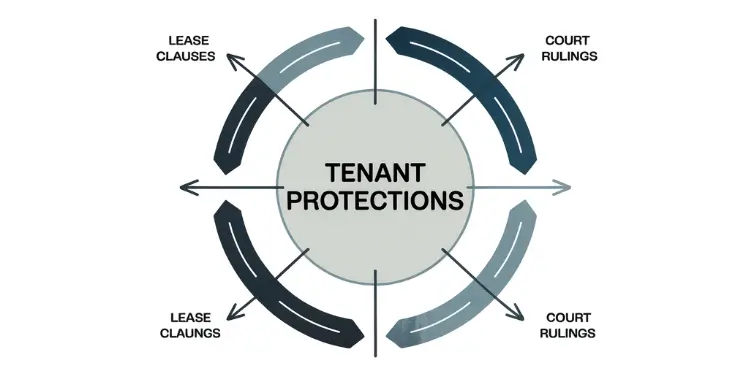
Historical court cases shaping precedent
Many important court cases have helped shape the covenant of quiet enjoyment. These cases have set rules for what counts as a problem and how to enforce tenant rights under US law.
| Case Name | Decision Year | Impact on Quiet Enjoyment |
|---|---|---|
| Stuart v. Laird | 1909 | Defined substantial interference as a breach |
| Blackett v. Olanoff | 1977 | Emphasized landlord’s direct or indirect role in disturbance |
| Westminster Investment v. Gibson | 1985 | Incorporated construction-related disturbances |
These rules help landlords know what they must do. They also help tenants know how to stand up for their rights. By learning from these cases, tenants can fight for their covenant of quiet enjoyment rights better.
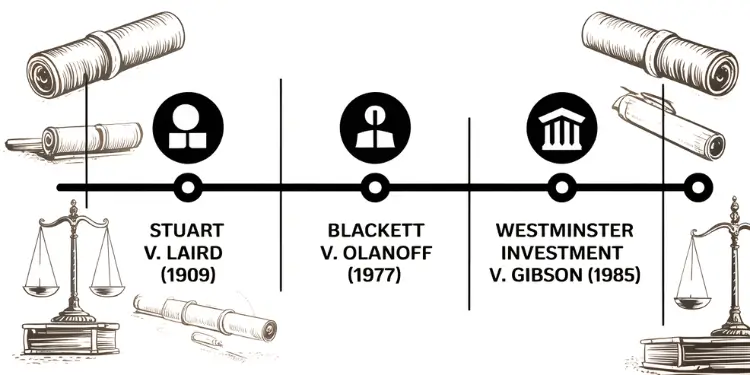
Case law like Blackett v. Olanoff confirms landlords can breach quiet enjoyment by allowing neighbor disturbances they control. Ref.: “LegalClarity Team (2025). Breaking a Lease Due to Quiet Enjoyment Violations. LegalClarity Property Law.” [!]
“Read More: Rent increase clause sets clear annual hike limits protecting tenants“
Common landlord actions breaching peaceful occupancy
Many landlords do things that break the quiet enjoyment rule. This rule is in lease agreements. It’s important to know these violations to protect tenants’ rights. Here are common ways landlords might disturb tenants, each a breach of quiet enjoyment.
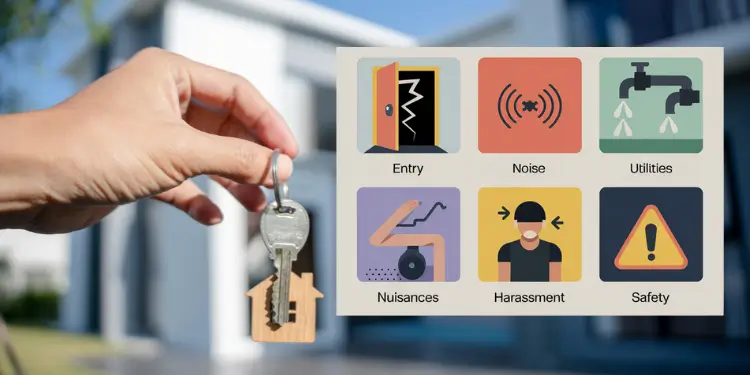
Legally, landlords must provide ‘reasonable notice’—typically 24–48 hours—before entry to comply with the covenant of quiet enjoyment. Ref.: “KRSHoldings (2025). Landlord Guide to The Implied Covenant of Quiet Enjoyment.” [!]
Intrusive Inspections Without Proper Notice
Landlords can’t just enter without telling you first. They must give notice before coming in. This notice lets you stay peaceful and quiet in your home.
Excessive Noise From Landlord Operations
Too much noise from landlord work can upset you. Some noise is okay, but landlords should keep it down. If they don’t, you might sue for quiet enjoyment.
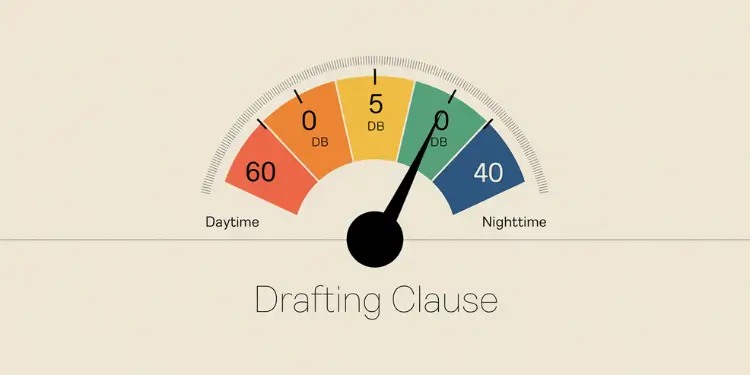
Utility Disruptions Impairing Habitability Rights
Not having basic services like water or heat is a big problem. Tenants should have these services. If a landlord doesn’t fix these issues, it’s a quiet enjoyment breach.
| Common Violation | Description | Impact |
|---|---|---|
| Unlawful Entry | Entering the tenant’s property without proper notice or legal justification | Violates tenant’s privacy and right to peaceful occupancy |
| Noise Disturbances | Excessive noise from other tenants or landlord’s maintenance activities | Disrupts peaceful and quiet enjoyment |
| Service Failures | Failing to provide or repair essential utilities | Impairs habitability rights |
| Allowing Nuisances | Not addressing disruptive behaviors from others | Disturbs tenant’s peace and quiet |
| Harassment | Any behavior by the landlord intended to disturb the tenant | Creates an uncomfortable living environment |
| Health and Safety Neglect | Not maintaining the property in a safe condition | Poses risks to tenant’s well-being |
These actions not only break the quiet enjoyment rule but can also lead to legal trouble for landlords. For more on quiet enjoyment and tenant rights, click here.
“Related Topics: Top lease clauses tenants should know“
Tenant remedies when violations persist
When landlords keep breaking the quiet enjoyment rule, tenants have a few options. First, write to the landlord about the problem. Talk about your right to privacy and peace. List the times and dates of the issues to make your case stronger if you need to go to court.
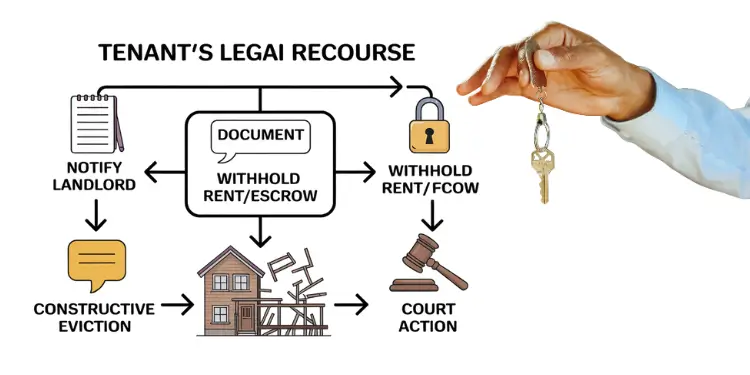
Another good move is to stop paying rent if the problem makes the place hard to live in. But, check the local laws first. In some places, you have to put the rent you didn’t pay in a special account until the problem is fixed.
If the place is really bad, you might think about moving out legally. This is called constructive eviction. It means the landlord made it so you had to leave, and you don’t have to pay penalties. If this happens, you can sue for damages or other help.
If talking and not paying rent don’t fix the problem, you can go to court. You might sue for money or ask a judge to stop the landlord from bothering you more. For more advice on quiet enjoyment complaints, check out Bay Management Group’s blog.
| Violation Type | Recommended Remedy | Legal Consideration |
|---|---|---|
| Frequent intrusive inspections | Document and communicate breaches | Possible grounds for legal action if persistent |
| Utility disruptions | Withhold rent under local laws | Must place rent in escrow in some states |
| Landlord harassment | Seek injunction or restraining order | Detailed records can aid court cases |
| Severe neglect causing uninhabitable conditions | Consider constructive eviction | Terminate lease without penalty |
“Further Reading: Basic lease agreement terms“
Drafting clause language protecting tenant privacy
When making *lease clauses* for privacy, being clear is important. People in *urban leases* need careful terms to keep their peace. By setting sound limits and rules for nighttime work, we keep privacy and peace.
Specific Decibel Limits in Urban Leases
Noise is a big problem in *urban leases*. Putting clear sound limits in leases helps keep quiet. These limits should match what’s normal in the area, so everyone can rest well.
- Daytime maximum: 60 dB
- Evening maximum: 50 dB
- Nighttime maximum: 40 dB
Setting these limits helps make a quiet place for tenants.
Municipal ordinances often set daytime residential noise limits between 45 dB and 60 dB—mirroring these in leases provides clear, enforceable standards. Ref.: “LegalClarity. (2025). Can I Play Loud Music in My Apartment During the Day? LegalClarity.” [!]
Nighttime Restriction Clauses for Maintenance
It’s also key to have rules for nighttime maintenance. Work done at night can really upset tenants and mess up their sleep.
- No maintenance work between 10 PM to 7 AM
- Emergency repairs only during these hours
- Advance notice required for non-emergency maintenance
These rules in *lease terms* stop sudden noise, keeping tenants’ right to quiet.
Lease clauses specifying time-based decibel caps and restricted maintenance hours are proven to reduce noise‑related disputes. Ref.: “The Legallo Editorial (2024). Understanding Quiet Enjoyment: Legal Rights and Implications.” [!]
“You Might Also Like: Maintenance responsibilities clause what tenants“
Evidence collection documenting disturbance incidents
Handling lease disputes well means keeping good records of trouble. Tenants should write down when and how the landlord broke the rules. This proves their point in disputes.
For noise problems, tenants can use apps or special tools to measure sound. Keeping track of these readings and when they were taken is key. It helps prove the landlord was too loud.
It’s also important to save all messages with the landlord. This includes emails, texts, and letters about the trouble. It shows the tenant tried to fix the problem the right way.
Photos and videos of the trouble can also help. Pictures of broken locks or unwanted entry show the landlord did something wrong.
Here’s a table to help remember what evidence to collect and how:
| Type of Evidence | Collection Method | Purpose |
|---|---|---|
| Log Entries | Note dates and times of incidents | Show patterns of disturbances |
| Noise Decibel Records | Use sound meter apps or devices | Prove excessive noise levels |
| Communication Records | Save emails and messages | Document attempts to resolve issues |
| Photographs and Videos | Capture images of disturbances | Provide visual proof |
“Related Articles: Landlord entry clause limits on unexpected inspections“
Regional regulations strengthening quiet enjoyment clauses
Quiet enjoyment is a key right for tenants. But, how it’s enforced can change a lot because of different state laws and local rules. These rules help make sure everyone can live peacefully.
State Law Variations and Local Ordinances
State laws set the basic rules for quiet enjoyment. But, how these laws are applied can vary. For example, California’s Civil Code Section 1927 says tenants have the right to quiet use of their space.
New York’s Real Property Law Section 235-b says landlords must keep places quiet. Knowing the property laws in your area is very important.
Local rules add more details. They might make noise laws stricter or require landlords to write clear rules in leases. For instance, Seattle has strict noise laws to help with quiet enjoyment. Austin has “quiet hours” in rental agreements.
It’s very important to know these local rules. This helps keep everyone in line with the law and protects tenant rights.












